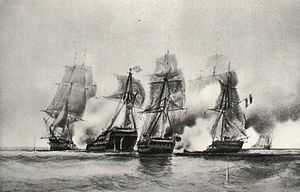French frigate Prudente (1790)
 | |
| Career (France) | |
|---|---|
| Name: | Prudente |
| Namesake: | Prudency |
| Builder: | Lorient |
| Laid down: | May 1789 |
| Launched: | 21 September 1790 |
| In service: | October 1790 |
| Captured: | 9 February 1799 |
| General characteristics | |
| Class and type: | Capricieuse-class frigate |
| Displacement: | 600 tonnes |
| Length: | 44.2 m (145 ft) |
| Beam: | 11.2 m (37 ft) |
| Draught: | 5.5 m (18 ft) |
| Propulsion: | Sail |
| Armament: | 32 guns |
| Armour: | Timber |
The Prudente was a 32-gun Capricieuse-class frigate of the French Navy.
Career
In 1791, under lieutenant Villaret de Joyeuse, she was tasked with ferrying troops to Cap Français and with police duty in Santo Domingo. In 1793, she returned to France, escorting a convoy from Terre-Neuve, under Villaret de Joyeuse, by then promoted to Captain.
In 1794, she was the flagship of a frigate division under Captain Renaud, also comprising Cybèle, under Pierre Julien Tréhouart. She took part in the Sunda Strait campaign of January 1794 and in the Action of 22 October 1794 off Ile de France. During the Sunda Strait campaign the squadron captured the East Indiaman Pigot.
In 1796, Prudente was attached to the squadron under Sercey, that had come from France.
She served for a time at Mauritius, taking part in the Action of 8 September 1796, before being sold and becoming a privateer.[1]
Capture
Daedalus captured Prudente on 9 February 1799 near Table Bay, Cape of Good Hope. At daybreak Daedalus spotted two sails and gave chase to the larger vessel, catching up with her at about 12:30. The quarry struck after an action of almost an hour. She proved to be the Prudente, which Captain H.L. Ball referred to as a French National frigate, rather than a privateer. She was pierced for 42 guns but was armed with twenty-six 12-pounder long guns on her main-deck and two long 6-pounders and two brass howitzers on her quarterdeck. She had a crew of 297 men. In the fight, Daedalus lost two men killed and 12 wounded. Prudente lost 27 men killed and 22 wounded. The ship in her company, which escaped, was an American vessel that she had taken as a prize.[2]
Notes and References
Notes
References
- ↑ Hennequin, p.209
- ↑ The London Gazette: no. 15161. p. 732. 20 July 1799. Retrieved 18 January 2011.
Bibliography
- Hennequin, Joseph François Gabriel (1835). Biographie maritime ou notices historiques sur la vie et les campagnes des marins célèbres français et étrangers (in French) 2. Paris: Regnault éditeur.
- Roche, Jean-Michel (2005). Dictionnaire des bâtiments de la flotte de guerre française de Colbert à nos jours 1. Group Retozel-Maury Millau. p. 367. ISBN 978-2-9525917-0-6. OCLC 165892922.